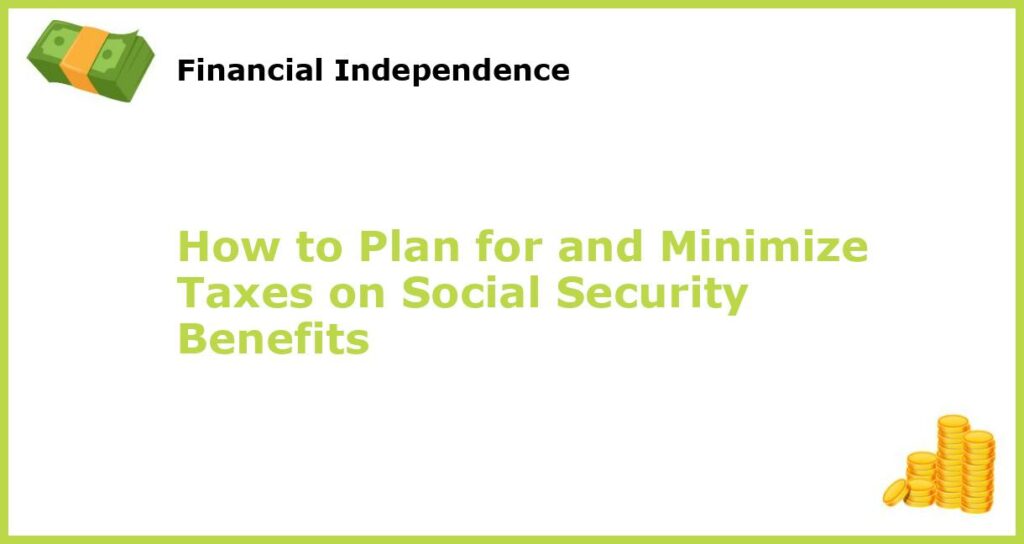Retirement is a time to enjoy the fruits of your labor, and for many, that means relying on Social Security benefits to help supplement their income. However, it’s important to keep in mind that these benefits can be subject to federal income tax, which can quickly eat into your retirement savings. Luckily, there are several strategies you can use to minimize the taxes you’ll owe on your Social Security benefits.
Understanding Social Security Taxes: What You Need to Know

At its core, Social Security is designed to supplement your retirement income, providing a financial safety net for those who have reached retirement age. However, depending on your income level, you may be required to pay taxes on your Social Security benefits. For individuals or married couples with a combined income over certain thresholds, up to 85% of their Social Security benefits may be subject to federal income tax. This can be a significant hit to your retirement savings, which is why it’s essential to have a solid plan in place to minimize the impact of taxes on your benefits.
One important thing to keep in mind is that your Social Security benefits are based on your work history, so the amount you receive each month may vary depending on your earnings history. If you’ve worked consistently throughout your career and have maxed out your Social Security credits, you’ll likely receive a higher monthly benefit than someone who only worked part-time or took several years off from work. As such, it’s important to review your Social Security statement regularly to stay informed about the benefits you can expect to receive in retirement.
Maximize Contributions to Retirement Accounts

One effective way to minimize taxes on your Social Security benefits is to maximize contributions to your retirement accounts. This includes traditional 401(k)s, IRAs, and other retirement savings vehicles that allow you to make pre-tax contributions. By doing so, you can lower your overall taxable income, which can in turn reduce the percentage of your Social Security benefits that are subject to federal income tax each year. For example, if you typically receive $1,500 in Social Security benefits each month and are in the 22% tax bracket, you could end up reducing your tax bill by $396 per year by maxing out your 401(k) contributions.
Keep in mind that there are limits to how much you can contribute each year to these accounts, and there may be age restrictions or other eligibility requirements that apply. Be sure to consult with a financial planner or tax professional to determine the best approach for your unique situation.
Delay Claiming Social Security Benefits

Another way to minimize taxes on your Social Security benefits is to delay claiming them. The age at which you begin claiming Social Security benefits can have a significant impact on the amount you’ll receive each month, so it’s essential to carefully consider your options before making any decisions. Generally speaking, the longer you wait to start claiming your benefits, the more you’ll receive each month, which can help maximize your retirement income and minimize the amount of taxes you’ll owe on your benefits.
For example, if you were born after 1960, your full retirement age is 67. However, if you wait until age 70 to claim your benefits, you could receive up to 124% of your full monthly benefit amount, which can make a big difference in your overall retirement income. Keep in mind that this strategy may not make sense for everyone, so be sure to consult with a financial planner or tax professional to determine if it’s the right approach for your unique situation.
Consider a Roth Conversion

If you have a traditional 401(k) or IRA, you may want to consider converting some or all of your funds to a Roth account. While you’ll have to pay taxes on the amount you convert, future withdrawals from the Roth account will be tax-free, which can help reduce your overall tax bill in retirement. This strategy can be particularly effective if you expect your income to be higher in retirement than it is currently, as it can help you avoid paying higher taxes on your benefits later on. However, keep in mind that this strategy may not be right for everyone, so it’s important to seek advice from a qualified financial planner or tax professional.
Keep Income Below Certain Thresholds

Another way to minimize taxes on your Social Security benefits is to keep your income below certain thresholds. In 2021, for example, single taxpayers with a combined income under $25,000 and married couples filing jointly with a combined income under $32,000 won’t owe federal income tax on their benefits. By keeping your income below these thresholds, you can reduce the amount of taxes you’ll owe on your benefits and maximize your retirement income.
Of course, it’s not always possible to keep your income below these thresholds, particularly if you have significant retirement savings or other sources of income. In these cases, you may need to employ other strategies to minimize the impact of taxes on your Social Security benefits.
Consider Municipal Bonds
Municipal bonds can be an effective way to generate retirement income without incurring taxes on your Social Security benefits. These bonds are issued by state and local governments to fund public projects and typically provide a tax-free source of interest income. However, it’s important to carefully research any bonds you’re considering and only invest in those with high credit ratings to minimize your risk.
Be Strategic About Asset Distributions
When it comes to distributing your retirement assets, it’s important to be strategic about which accounts you withdraw from first. For example, withdrawing from a traditional IRA may trigger more taxes than withdrawing from a brokerage account, so it may make sense to withdraw from the latter account first. By carefully managing your asset distributions, you can minimize the amount of taxes you’ll owe on your benefits and maximize your overall retirement income.
Choose Where You Live Carefully
State income taxes can have a big impact on your overall tax bill, which is why it’s important to carefully consider where you’ll live in retirement. Some states, such as Florida and Texas, have no state income tax, while others, like California and New York, have relatively high income tax rates. Additionally, some states may tax Social Security benefits differently, which can impact the amount you’ll owe in taxes. Be sure to work with a financial planner or tax professional to determine which states offer the most tax advantages for your unique situation.
Consider Charitable Giving
Charitable giving is a tax-efficient way to reduce your overall tax bill and minimize the taxes you’ll owe on your Social Security benefits. By donating to a qualified charity, you can reduce your taxable income and potentially lower the percentage of your Social Security benefits that are subject to federal income tax each year. Be sure to work with a qualified tax professional to determine the best approach for your unique situation.
Stay Informed About Tax Law Changes
The tax laws surrounding Social Security benefits can change from year to year, so it’s important to stay informed about any changes that could impact your taxes and retirement income. Work with a financial planner or tax professional who specializes in retirement planning to stay up-to-date on any changes and ensure that you’re making the best decisions for your unique situation.







